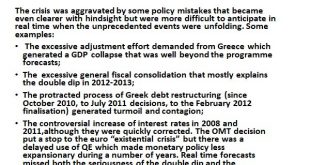I haven't written a post for a while. I wanted everyone to read the post I wrote in November about my niece Annie's suicide. Writing new posts drops older ones down the list, and I didn't want her memorial post to disappear off the radar until after her funeral. Annie's funeral was last Tuesday, 18th December, the day after her 29th birthday. Now, it is time to write again.But not yet to move on from the issues that Annie's death highlights. This post is about the link between mental ill...
Read More »Bill Mitchell — The ‘fiscal contraction expansion’ lie lives on – now playing in Italy – Part 2
This is the second and final part in my discussion about the latest attempts by the IMF and notable New Keynesian macroeconomists to keep the ‘fiscal contraction expansion’ lie alive. The crisis in Italy is once again giving these characters a ‘playing field’ to rehearse their destructive ideas that rose to prominence during the worst days of the GFC, when the European Commission and the IMF (along with the OECD and other groups) touted the idea of ‘growth friendly’ austerity. Nations were...
Read More »Bill Mitchell — The ‘fiscal contraction expansion’ lie lives on – now playing in Italy – Part 1
Pathetic was the first word that came to mind when I read this article – The Italian Budget: A Case of Contractionary Fiscal Expansion? – written by Olivier Blanchard and Jeromin Zettlemeyer, from the Peter Peterson Institute for International Economics. Here is a former IMF chief economist and a former German economic bureaucrat continuing to rehearse the failed ‘fiscal contraction expansion’ lie that rose to prominence during the worst days of the GFC, when the European Commission and the...
Read More »Arguments for austerity, old and new
Here what I think may be is Fernando Cardim de Carvalho's last published paper (who passed away recently), published in Intervention. From the abstract: Much of the criticism directed at austerity programs implemented after the 2007/2008 financial crisis, more forcefully in the eurozone, have relied on the same arguments Keynes and others raised against the (British) Treasury View developed in the 1920s and 1930s. Austerity, however, has been proposed most insistently in the 2010s by...
Read More »Britain’s Flagging Economy: is Brexit to blame?
Article for Prospect Magazine 21 November, 2018. Ann Pettifor, Council Member, Progressive Economy Forum. According to Heisenberg’s uncertainty principle there are limits to the precision with which we can be certain about the properties of a particle. ….the position and the velocity of an object cannot both be measured exactly, at the same time, even in theory. The very concepts of exact position and exact velocity together, in fact, have no meaning in nature. As in physics so in...
Read More »Heiner Flassbeck — The economic situation in Bulgaria and Romania – Part 2
How little the two Eastern European countries that we have focused on can be compared with Western countries can be seen very clearly in the development of unemployment (Graph 1). Following the major crisis of 2008/2009, the unemployment rate in Romania hardly rose at all. In Bulgaria it increased significantly, but despite weak economic development after 2013 it is falling at an astonishing rate, almost to the relatively low Romanian level.For Romania, this can only mean that unemployment...
Read More »Now state pension ages are equalised, let’s fix the real problems
Today is a day for celebration. After nearly 60 years of inequality and discrimination - originally against women, and more recently against men - the state pension age is at last the same for men and women. For one day only, both men and women will retire at 65. Tomorrow, the state pension age for both men and women will start rising again in lockstep, reaching 66 by 2020 and then to 67 and 68.I make no apology for celebrating the equalisation of pension ages. In my view this is long...
Read More »The End of Brazilian Democracy
As noted in my previous post on this, there was a good chance that the Neo-Fascist candidate Jair Bolsonaro would win the election in Brazil. And he did, with approximately 39 percent of all votes. There are only a few things that I want to point out about this. The Workers' Party (PT) candidate received about 32 percent of all votes. Note that 29 percent or so did not vote, in one way or another. So PT maintained almost one third of the electorate in this election, while its rival in...
Read More »Crashed: How a Decade of Financial Crises Changed the World
Book Review Adam Tooze. Crashed: How a Decade of Financial Crises Changed the World. Viking. New York. 2018 The global economic crisis is now more than a decade old, and is far from definitively behind us. Indeed, many fear, with good reason, that the recent, uneven and lethargic global recovery may soon come to an end, and that the next crisis of global capitalism could be even worse than that of 2008. The financial crisis and resulting crisis of the real global economy triggered by the...
Read More »Vítor unbound
I always find the views of former policymakers fascinating, not least because of their tendency to become much more outspoken once they are out of office. Some express much more radical views than they did while in office: Larry Summers springs to mind, and Adair Turner. Others become critical of the institutions that they ran: Mervyn King, for example. The latest former policymaker to reveal what he really thinks is Vítor Constâncio, Vice President of the ECB from 2010 to 2018. In a...
Read More » Heterodox
Heterodox




